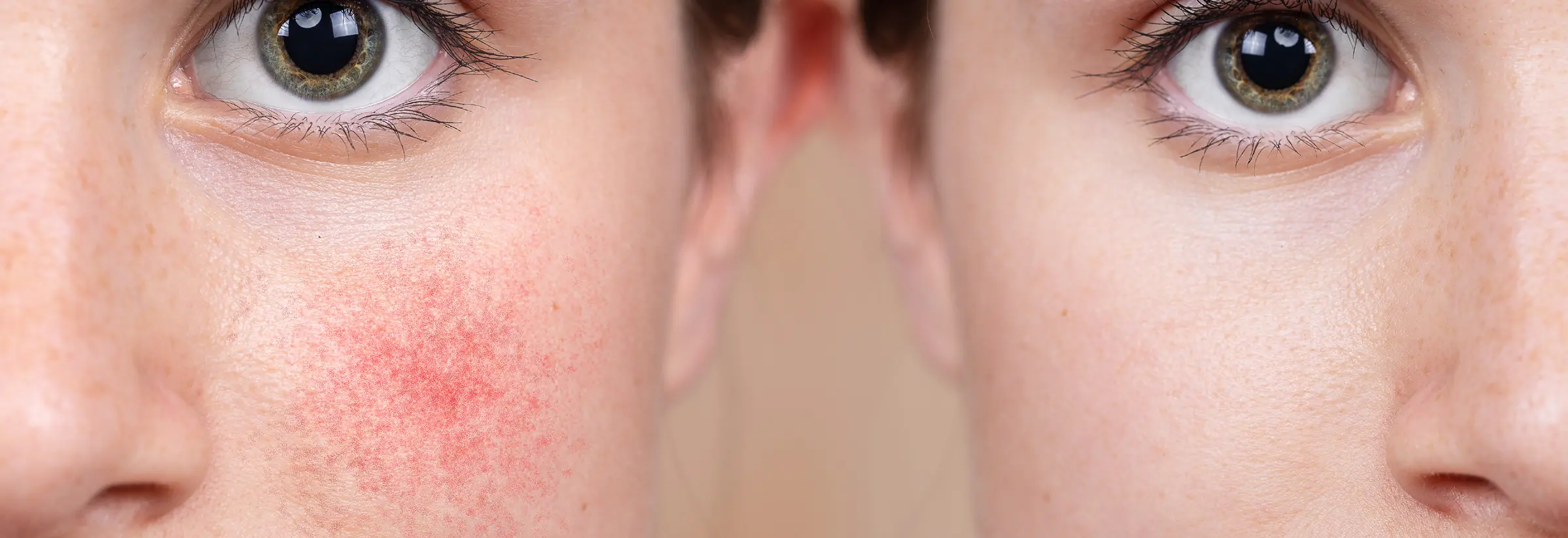
Dermatology
Treating rosacea – effective therapies for rosacea
Rosacea is a very unpleasant, chronic skin disease of the face. Commonly known as “rosebud” or “copper rose”, the disease begins in adulthood as couperose and progresses in phases.
The cause of rosacea is still not clearly understood. Hereditary factors and external influences such as heat, sun, saunas or very cold weather appear to have an influence. The consumption of certain stimulants such as alcohol, hot spices or hot drinks also appear to have an influence. In addition, many people also react to emotional stress and often suffer a new flare-up of rosacea as a result.
Rosacea is often confused with acne or other skin diseases. However, rosacea does not cause the formation of blackheads. A clear diagnosis is particularly important in the case of rosacea, as only then can it be contained in the long term with individualised therapy. Although rosacea is unfortunately not curable, it is possible to control the skin disease over a long period of time and prevent the recurrence of flare-ups with personalised treatment that is appropriate to the stage of the disease.
In the dermatology practice at the ETHIANUM Clinic in Heidelberg, our specialist develop an individual treatment plan for rosacea.
Read a compact summary of the different stages of rosacea and the methods we use to combat the skin disease.
Dermatology
Rosacea – the stages of the skin disease
Rosacea develops in three different stages. It is essential to determine these, as the skin disease must be treated differently in each stage.
- Stage I – Rosacea erythematosa (couperose): The first symptom of rosacea is usually fleeting reddening of the skin on the face, which initially disappears but persists as the disease progresses. The reddening of the skin is accompanied by the permanent dilation of veins. These appear as fine, short red lines on the skin. Stinging, burning and itching of the skin are unpleasant side effects Stage II – Rosacea papulopustulosa: Inflamed papules and pustules develop on the reddened areas of skin, usually on the forehead, cheeks and chin, and persist for a long time. In contrast to acne, however, there are no blackheads in rosacea. Rosacea is also almost always limited to the face. Stage III – Glandular-hyperplastic rosacea: The inflamed skin changes lead to an enlargement of the sebaceous glands. Nodules and increased connective tissue form. One consequence of this tissue proliferation is the development of various thickenings, which particularly often affect the nose. This “bulbous nose” can no longer disappear spontaneously.
In addition to these three stages of rosacea and the classic course of the disease, there are also some special forms of rosacea. These special forms require special treatment. At the ETHIANUM, our skin specialists also treat the special forms of rosacea.
The special forms include
- Ganulomatous / lupoid rosacea
- Steroid rosacea
- Morbihan’s disease
- Ocular rosacea
- Rosacea fulminans
Dermatology
Treating rosacea – treatment options for the skin disease
The treatment of rosacea depends on the stage of the disease and is customised. Drug therapies can prevent the spread of rosacea and alleviate the painful symptoms of the skin disease. Tablets containing azelaic acid, metronidazole or antibiotics and isotretinoin are used for drug treatment.
Unfortunately, however, rosacea in stage III can also become a psychological burden for clients. This is because the proliferation of connective tissue can lead to a “bulbous nose”, for example, which can be perceived as unattractive and disturbing. If non-surgical treatments for rosacea do not promise success at this stage, the skin specialists at the ETHIANUM Clinic recommend surgery. Very good cosmetic results can be achieved by narrowing the nose by sanding or treatment with a CO₂ laser. Thanks to the interdisciplinary cooperation between the doctors at our clinic, you will quickly and easily find a competent specialist in plastic and aesthetic surgery to whom you can entrust this operation with confidence.
